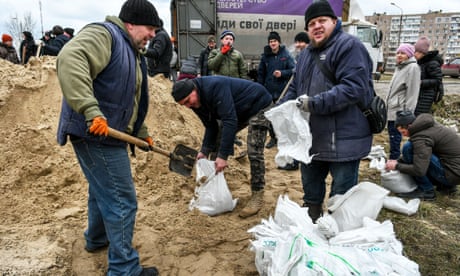- by foxnews
- 28 Mar 2025
As civilians leave, fortress Kyiv grimly prepares for Russian advance
As civilians leave, fortress Kyiv grimly prepares for Russian advance
- by theguardian
- 06 Mar 2022
- in news

An army crane pulls concrete breeze blocks into the middle of the road. A group of youths empty shovel-loads of sand into sacks to make sandbags. Middle-aged men leave their families for long shifts out in the cold.
Over the past week, these makeshift armed positions have sprung up with increasing speed on both major and minor roads on the routes into Kyiv.
The Ukrainian capital is now a fortress, at least partly defended by a volunteer army of local people.
He had plotted out the location of checkpoints in his small district to create a network of defences that, he hoped, would be impossible to circumvent. Local officials contacted teachers and managers to do cursory checks on those volunteering to receive a gun and guard the posts.
But after the initial attempts to seize the capital speedily, there are now fears that Russia may do what it has done in cities such as Kharkiv and Chernihiv and bring in airstrikes against civilian targets.
Kyiv, which just a fortnight ago was a bustling European metropolis, is now eerily deserted. The only sounds in the centre are the ringing of church bells and the wail of the air raid sirens, which sound a few times a day. Occasionally, a police car or military vehicle speeds past, daubed with yellow paint or marked with yellow tape, the mark of Ukrainian forces.
In contrast to the silent streets, the train station is a maelstrom of chaotic activity. Inside the cavernous central hall, a grand Soviet structure filled with mosaics, mirrors and two multi-tiered chandeliers, a crush of people waited to get to the platforms.
The Ukrainian rail service has evacuated more than a million people since the war began, and for trains going west, no tickets are required, just patience and sharp elbows. Women and children have top priority, then pensioners. Trains heading eastwards depart mostly empty, while those arriving from in the other direction are mobbed by crowds as soon as they pull into the platform.
While there has been fierce fighting on the western edges of the city, the centre has not seen heavy bombardments this week, except for a strike against the television tower that killed five people. But this grim anticipation is its own kind of torture.
At one metro station in the suburbs on Thursday, there were about 100 people spread out across the platform and sprawled on benches in the open carriages of a train parked in the station, hiding from possible airstrikes.
Some had plastic containers of food, folding furniture and mattresses, while others slept on the cold floor with just a blanket and pillow.
Lying on a bench with half a toilet roll, a cup of strong tea and a hunk of bread, 54-year-old Ivan had been inside the station for eight days. He had travelled into Kyiv on 22 February from his home town of Ivankiv, to work a 48-hour shift in his construction job. By the time his shift was over, Russia had invaded and there was fighting in his home town and along the route. Since then, he has been sleeping in the metro, eating food delivered by volunteers, unable to get home to his wife and young daughter.
At one checkpoint outside Kyiv earlier in the week, a man could be seen tied up at the side of the road. Amid persistent rumours that Russian diversanty may in certain cases be disguised as foreign journalists, some nervous residents have taken to calling in sightings of journalists to police. There are many reports of friendly fire incidents.
The man, who did not want to give his name, said the one time he had gone out alone since the start of the war, he was immediately arrested, had a bag put over his head and was driven away for questioning as a suspected diversant, before his commander was called in to vouch that he was fighting on the Ukrainian side.
There is a reason for the fear and paranoia: few doubt that Russia really has sent diversionary groups into Ukraine, and there are persistent rumours of a plot to assassinate the president, Volodymyr Zelenskiy.
The commander of the territorial defence unit based in a building near the presidential administration is 58-year-old Yevgeny Ptashnik. He said this was his third war, after Afghanistan in the 1980s and east Ukraine in 2014. He volunteered on the first day. He said the current Ukrainian struggle reminded him of the fight of the determined Afghans against the powerful but unmotivated Soviet army.
- by foxnews
- descember 09, 2016
Flight passenger says traveler sent $150 over Venmo in swap for aisle seat
A flight passenger says a fellow traveler who wanted to sit next to his friend paid $150 through Venmo to switch a middle seat for an aisle seat. Social media users joined the debate.
read more


